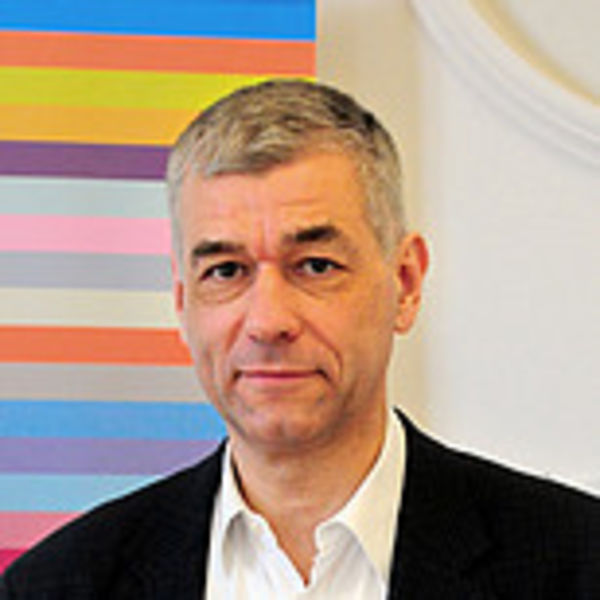
March 2011 - February 2012
Mail th.bremer(at)uni-muenster(dot)de
Thomas Bremer was a fellow at the Imre Kertész Kolleg Jena at the Friedrich Schiller University from March 2011 until February 2012. Since 1999 he has been teaching studies of Eastern European churches as well as ecumenical theology at the catholic-theological faculty of the University of Münster. From 2003 to 2005 he was dean of that faculty, and chairman of the German Society for Eastern European Studies in Berlin from 1995 to 1999. From 1985 on he was an assistant at the (former) catholic-ecumenical institute of the University of Münster. In 1990, Bremer received his Ph.D. doing a study in ecclesiology of the Serbian Orthodox Church. He studied catholic theology, Slavic and classic philology in Munich, Belgrade and Münster.
In the 20th century, churches in Eastern Europe were often involved in wars and conflicts, and also had to deal with the question of war and violence theoretically. The project investigates the forms of theological legitimisation of violence which were developed in the (Russian and Serbian) orthodoxy in the 20th century as well as alternative models such as the demand for a non-violent solution of conflicts and reconciliation. It investigates continuities in the history of theology within the Eastern European orthodoxy. The orthodox opinion of state and nation are the basis on which Eastern theology developed concepts of legitimisation of war and violence. It is the purpose of this project to investigate and depict figures of argumentation of legitimising violence, their historical and theological classification as well as their relation with Western theological approaches and demands of reconciliation.
Kreuz und Kreml. Kleine Geschichte der orthodoxen Kirche in Russland, Freiburg 2007. (ital. translation: La croce e il Cremlino, Brescia 2008.; serb., bulgar., engl. translation in preparation).
Kleine Geschichte der Religionen in Jugoslawien. Königreich, Kommunismus, Krieg, Freiburg 2003.
Konfrontation statt Ökumene. Zur kirchlichen Situation in der Ukraine, Erfurt 2001.
Ekklesiale Struktur und Ekklesiologie in der Serbischen Orthodoxen Kirche im 19. und 20. Jahrhundert, Würzburg 1992 (Das östliche Christentum, N.F. Bd. 41) Serbische Übersetzung: Vera, politika i kultura, Niš 1997.
Glaubenssache. Kirche und Politik im Osten Europas (with M. Sapper, J. Sapper und V. Weichsel), Berlin 2009 (= Osteuropa 59, 6).
Religion and the Conceptual Boundary in Central and Eastern Europe. Encounters of Faiths, Basingstoke 2008.
Religion und Nation. Die Situation der Kirchen in der Ukraine (Schriften zur Geistesgeschichte des östlichen Europa, Bd. 27), Wiesbaden 2003.
Religija, društvo i politika. Kontroverzna tumačenja i približavanja, Bonn 2002.
Orthodoxie im Dialog. Bilaterale Dialoge der orthodoxen und der orientalisch-orthodoxen Kirchen 1945-1997 (with J. Oeldemann und D. Stoltmann), Trier 1999.
Serbiens Weg in den Krieg. Kollektive Erinnerung, nationale Formierung und ideologische Aufrüstung (with N. Popov und H.-G. Stobbe), Berlin 1998.
Religion und Nation im Krieg auf dem Balkan (Wissenschaftliche Arbeitsgruppe für weltkirchliche Aufgaben der Deutschen Bischofskonferenz, Projekte 2), Bonn 1996.
Die orthodoxe Kirche als gesellschaftlicher Faktor in Russland, in: Pleines, H./ Schröder, H. - H. (Hg.):Länderbericht Russland, Bonn 2010 (Schriftenreihe der Landeszentrale für Politische Bildung, Bd. 1066), S. 441-456.
Gott und die Welt. Kirche und Religion in Osteuropa (zus. mit J. Wasmuth), in: Osteuropa 59 (2009), S. 7-28.
Theologische Hintergründe des Euroskeptizismus in den orthodoxen Kirchen Südosteuropas, in: Schubert, G. (Hg.):Europa, das ich meine..., Jena 2009, S. 81-92.
The Official Theological Dialogue between the Roman Catholic and the Orthodox Churches, in: Murzaku, I.A. (Hg.): Quo Vadis Eastern Europe? Religion, State and Society after Communism, Ravenna 2009, S. 61-73.
Versagt? Die Kirchen und die Balkankriege der 90er-Jahre [sic!], in: Reuter, H.-R. (Hg.): Frieden - Einsichten für das 21. Jahrhundert, Münster 2009, S. 134-146.
Lucian, N. (Hg.): Eastern Christianity and the Cold War, 1945-91, Leustean, London - New York 2009, in: Jahrbücher für die Geschichte Osteuropas 59 (2011). (forthcoming)
Teigeler, Otto: Die Herrnhuter in Russland. Ziel, Umfang und Ertrag ihrer Aktivitäten, Göttingen 2006, in: Jahrbücher für Geschichte Osteuropas 58 (2010), S. 435-436.
Knechten, Heinrich Michael: Filaret von Moskau als geistlicher Schriftsteller, Waltrop 2008; ders.: Kraft in der Schwachheit. Dimitrij von Rostov, Kamen 2009, in: Theologische Revue 106 (2010), S. 476.
Mitrofanova, Anastasia V.: The Politicization of Russian Orthodoxy. Actors and Ideas, Stuttgart 2005, in: Jahrbücher für Geschichte Osteuropas 57 (2009), S. 315-316.
Nikolaou, Th.: Die Orthodoxe Kirche im Spannungsfeld von Kultur, Nation und Religion, St. Ottilien 2005, in: Ostkirchliche Studien 59 (2010), S. 133f.